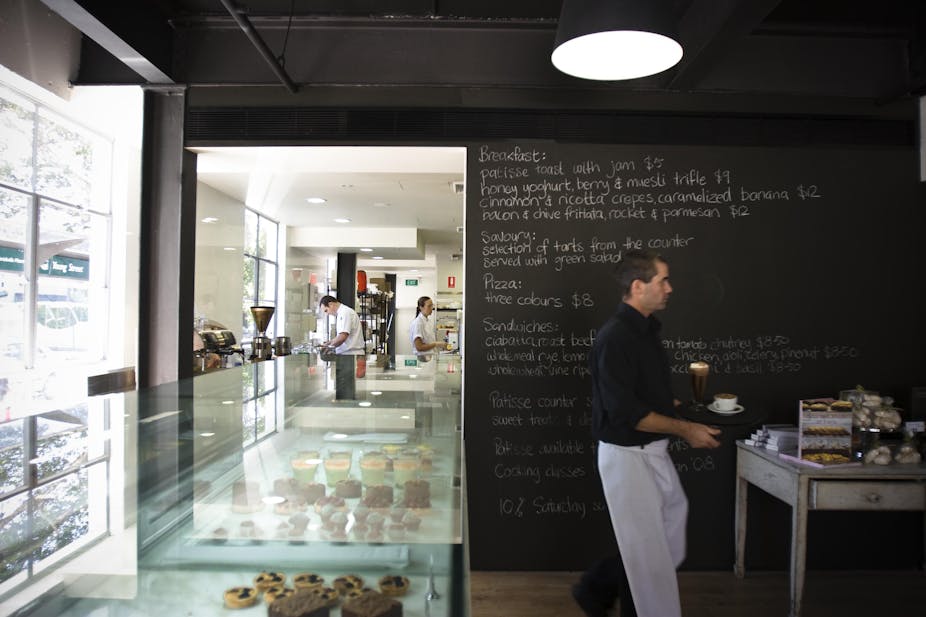Australian Prime Minister Tony Abbott recently commented that if employees
“don’t want to work on a weekend, fair enough, don’t work on a weekend … But if you do want to work on a weekend — and lots of people, particularly young people, particularly students, would love to work on a weekend — you want the employers open to provide jobs…”
But many don’t love working weekends. Those who do are probably working more out of necessity than by choice. The physical, social and community costs of forgoing a day or two of rest are significant. Consequently, it is argued that after-hours workers should be compensated fairly for that cost.
Lowering the minimum wage and removing penalty rates would hit hardest the most vulnerable workers – groups like students and the poor.
But it’s worth remembering that many other people working irregular hours do so because we benefit greatly from their after-hours labour: think of the nurses, those working in hospitality or bus drivers who keep things ticking over while others sleep or rest.
Policy makers need to consider the cultural value of the weekend and of rest before they start tweaking penalty rates.
Staying afloat
Abbott’s comments came in the wake of a series of Productivity Commission issues papers that signalled a potential review of the minimum wage and penalty rates.
The minimum wage is currently set at $622.20 a week – just over half of average weekly earnings. Last year the Commission of Audit recommended lowering the minimum wage to around $488.90 a week, or 44% of average weekly earnings.
Students who work while studying would be significantly affected by a cut to the minimum wage. Student poverty has been an increasing problem over the last decade, and lowering the wage could exacerbate this.
Research by the Educational Policy Institute in 2005 found that living costs for university students in Australia were the third highest in the world - and 60% of students were living below the poverty line. Around half of undergraduate students lived on less than a third of the national minimum wage.
Costs of living, including accommodation, have increased around two-fold since then. Those on youth allowance must make do with far less than the minimum wage.
Earning can reduce learning
Research from Griffith University has shown that, for many students, working too much can compromise their study. Lowering the minimum wage will presumably compel students to work more to maintain income levels.
The 2009 House of Representatives inquiry into combining school and work: supporting successful youth transitions noted that too much work can impact negatively on study in school. The same applies to university students.
The evidence has consistently shown that those who complete study fare better across a range of indicators. The broader economic benefits are widely understood. So lowering the minimum wage creates additional barriers that are counter-intuitive to the personal, economic and social benefits of study.
Nothing is sacred
Suggestions to revisit the minimum wage are part of a larger chorus of calls by business peak bodies to also reduce weekend penalty rates. Last year, for example, the Australian Chamber of Commerce and Industry (ACCI) led a campaign to lower Sunday penalty rates, arguing it would create jobs for young people.
For those who “choose” to work on weekends, the penalty rate provides an incentive for trading off this valuable social, family and rest time to maintain a living. But for many, the “choice” to work on weekends is somewhat illusory, because they need this income to survive, particularly while studying.
Busting the myth of the minimum wage
There is another myth arising from the debate over the minimum wage. The Productivity Commission wants to know “whether or not there is an impact from the minimum wage on employment”. Commentators have suggested that “it is obviously true that any sufficiently large minimum wage above the market price will lock workers out of the workforce”.
Well, maybe not. An emergent and widespread view held by high-profile and influential economists is that this view is to some extent erroneous. Over 600 economists signed a letter last year in support of a minimum wage rise, saying that “the weight of evidence [is] now showing that increases in the minimum wage have had little or no negative effect on the employment of minimum-wage workers, even during times of weakness in the labour market.”
Paying it forward
Having undergone nearly 20 years of unbroken economic growth, two questions arise. The first is why this growth has taken place despite the fact that minimum wage rates in Australia are double that of the US. The second and related question is why, having enjoyed this prosperity, those most vulnerable to changes in the minimum wage, such as the poor and the young, need to have that vulnerability exacerbated.
Contrast this to the massive increases in executive salaries over the last decade. What makes Australia additionally striking is that expectations of executive remuneration in Australia are unusually high.
That said, a recent poll by Essential Media also found that 81% of voters polled (including a significant majority of Liberal and National party voters) believe that people working beyond normal hours should be paid more. 68% were against reductions to weekend and public holiday rates for workers in retail and hospitality.
With an estimated 4 to 10% of adult employees on a minimum wage and therefore vulnerable to this kind of change, it will be interesting to see if the government responds to pressure from employers in the absence of hard evidence of the benefits of lowering the minimum wage and penalty rates.

